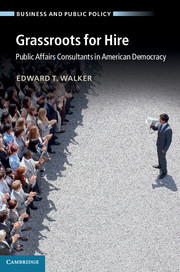Book contents
- Frontmatter
- Dedication
- Contents
- List of figures
- List of tables
- Acknowledgements
- Part I Sources
- Part II Structure
- 4 Methods for mobilizing the public
- 5 Corporate grassroots
- 6 Outsourcing advocacy? Consulting for associations
- Part III Outcomes
- Appendix 1 Identifying consulting firms (baseline data)
- Appendix 2
- Appendix 3
- Appendix 4
- Appendix 5
- Appendix 6 Models of consulting for non-trade associations
- Appendix 7 Models of consulting for trade associations
- Appendix 8 On public affairs consulting as a profession
- Bibliography
- Public documents referenced
- Index
4 - Methods for mobilizing the public
Published online by Cambridge University Press: 05 June 2014
- Frontmatter
- Dedication
- Contents
- List of figures
- List of tables
- Acknowledgements
- Part I Sources
- Part II Structure
- 4 Methods for mobilizing the public
- 5 Corporate grassroots
- 6 Outsourcing advocacy? Consulting for associations
- Part III Outcomes
- Appendix 1 Identifying consulting firms (baseline data)
- Appendix 2
- Appendix 3
- Appendix 4
- Appendix 5
- Appendix 6 Models of consulting for non-trade associations
- Appendix 7 Models of consulting for trade associations
- Appendix 8 On public affairs consulting as a profession
- Bibliography
- Public documents referenced
- Index
Summary
Introduction
We saw in the previous chapter how the field of public affairs firms was established, and how the development of these firms was in part a response to the expanded market demand for public mobilization services following the expansion of civic and business trade groups in the 1970s and 1980s. The present chapter examines how these consulting firms develop strategy in order to help their organizational clients manage their sociopolitical environments.
This chapter therefore examines organization–environment relationships on two levels.
On one level, public affairs consultants play a mediating role in helping their clients to manage public policy issues and respond to challenges that arise in their sociopolitical environments. They serve what organizational theorists refer to as a “boundary-spanning” function, connecting the organization to authorities and other core audiences on which the organization depends in order to sustain itself. They are therefore similar in many ways to other types of professional service firms (e.g., law firms, advertising companies, accountants, management consultants) in this general sense. However, they differ from most other professional service firms which do more to help their clients to comply with the demands of their legal, market, and/or institutional environments. It is in this respect that sociologists often find that legal compliance regimes are endogenous to organizational practices. While part of what public affairs consultants do is to help their clients conform to institutional pressures, they also help clients make strategic efforts to reshape those environments and resist such pressures.
- Type
- Chapter
- Information
- Grassroots for HirePublic Affairs Consultants in American Democracy, pp. 79 - 107Publisher: Cambridge University PressPrint publication year: 2014

